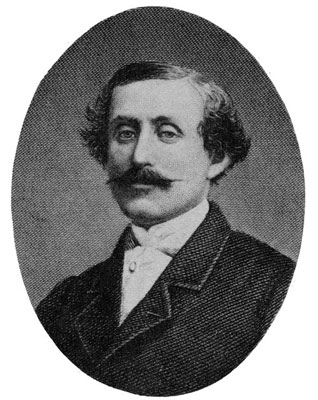
He did not begin by performing in public, but rather he gave recitals in the salons of wealthy New Orleans individuals. He was fond of taking Latin dance tunes and performing a series of variations on it, in his inimitable fashion. In this way he became the darling of New Orleans society.
In 1842 he left the United States and sailed to Europe, realizing that a classical training would be required to achieve his musical goals. Amazingly, at the age of 13, he was basically self-taught. In a letter to his mother, for example, he wrote that “I definitely expect that in two years or perhaps less I shall be earning a living on my own.” Things were not so easy as he might have imagined. First, the Conservatoire in Paris rejected his application. For this reason, Gottschalk had to study privately with Karl Hallé, Camille-Marie Stamaty and Pierre Malenden (the latter teaching composition). In the years to follow, he built a first career as a virtuoso, and Frédéric Chopin predicted that Gottschalk would soon become one of the foremost pianists of the century.
In 1853, Gottschalk returned to the United States, but it was not until 1860 that he became established as a major figure in American musical life, partly as a result of tremendous hard work . At ne point, in 1862, he gave 85 concerts (all at different locations) in just four and a half months. What life under such pressure was like is best summed up by the following remark in Gottschalk´s diaries: “Arrived half past eight at the hotel, took in a hurry a cup of bad tea, and away to business. One herring for dinner! nine hours on the train! and, in spite of everything, five hundred persons who have paid that you may give them two hours of poesy, of passion, and of inspiration. I confess to you secretly that they certainly will be cheated this evening.”
Here are a few samples of his less taxing work, one of the calm parts of The Union, which you might remember from Room 10. Listen!
Here is an excerpt from a rather gentle piece he wrote called La Savane (“The Tropical Plain”) based ona folk song called “Lolotte.” Listen!
At the same time that he gave solo concerts, he was composing copious amounts of piano pieces and orchestral pieces. He performed in Rochester New York a number of times and began to organize “monster concerts” at which five pianists including Gottschalk would play his arrangements from the operas Faust and Tannhäuser. As someone of the time wrote, “Gottschalk’s fingers moved on the keys with the speed of thought.”
In September 1865, his career took a sharp turn when Gottschalk had to leave the United States after a scandal about his relationship with a student at Oakland Female Seminary. Gottschalk left the country, embarking on what would become his last (and perhaps most successful) tour, during the course of which he travelled to Santiago de Chile, Buenos Aires, and Rio de Janeiro (and many other less well-known locations). His concerts were tremendously successful all across South America and sometimes took the form of “monster concerts” involving up to 650 performers.
Louis Moreau Gottschalk died Saturday, December 18, 1869, in Tijuca (Brazil), three weeks after collapsing during one his concerts, just when he had finished playing his sorrowful “Morte!!” and was about to begin moving on to the next piece.
If you need to leave, Go to initial page of site.
If you are interested in advertising a music-related business in the pages of the classroom, please send us an e-mail regarding rates by clicking here.